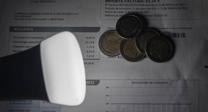Electricity price today and tomorrow: free hours | The price of electricity on Sunday will be free for 8 hours in a row at the new tariff.


Saturday, April 27, 2024, 7:19 p.m.
Good news for consumers. After several days when prices increased 10 times, the price of electricity began to decline. However, the level is not as low as a week ago. This Sunday, April 28, the average price for customers tied to a regulated tariff will be 28.72 euros per megawatt/hour. In addition, it will be presented for 8 hours, during which it will be free or have negative values.
These negative prices do not quite transfer to the receipt of these zero euros, since there are fixed costs for the electricity consumer due to tolls, charges and system adjustments. However, if we want to take advantage of these free hours to save as much as possible on our bill.
Electricity cost per hour
Electricity cost per hour
| Time section | Euro/MWh |
| 00.00-01.00 | 56.39 euros |
| 01.00-02.00 | 38.96 euros |
| 02.00-03.00 | 39.6 euros |
| 03.00-04.00 | 35.01 euro |
| 04.00-05.00 | 35.01 euro |
| 05.00-06.00 | 35.5 euros |
| 06.00-07.00 | 35.76 euros |
| 07.00-08.00 | 36.73 euros |
| 08.00-09.00 | 35 euros |
| 09.00-10.00 | 14.98 euros |
| 10.00-11.00 | 0 euro |
| 11.00-12.00 | 0 euro |
| 12.00-13.00 | 0 euro |
| 13.00-14.00 | 0 euro |
| 14.00-15.00 | 0 euro |
| 15.00-16.00 | 0 euro |
| 16.00-17.00 | -0.01 euro |
| 17.00-18.00 | 0 euro |
| 18.00-19.00 | 20.66 euros |
| 19.00-20.00 | 35.01 euro |
| 20.00-21.00 | 58.88 euros |
| 21.00-22.00 | 78.56 euros |
| 22.00-23.00 | 72.21 euro |
| 23.00-24.00 | 60.65 euros |
On average 5.5 euros/MWh in April: why this happens
The strong presence of renewables in early April, in the form of wind and solar, with a notable contribution from hydraulics with water dammed during the important Easter rains, results in an average for the 16 days of the month of €5.53. /MWh, as explained by Europa Press.
March already saw one of the lowest average pool prices in history for the month: 20 EUR/MWh, half the average price recorded in February and 77.5% lower than March 2023, when it was 89 .6 euros. /MWh
New tariff
In addition, in February, after recording an average below 45 EUR/MWh (the ceiling set by the Royal Decree of Urgent Measures), electricity temporarily reinstated its value added tax (VAT) of 21% from March, what was there will remain This month is April.
The last Council of Ministers last year approved an increase in the VAT rate on electricity from 5% to 10% and maintaining this rate until the end of 2024, subject to maintaining MWh prices on the wholesale market. high, above this 45 euro/MWh.
In particular, VAT will become 21% if the wholesale price is below this level in the calendar month preceding the last day of invoice. That is, all bills that include consumption for at least one day in March will have VAT of 21%. Only households receiving a social bonus are exempt from this increase, as their VAT will remain at 10% through 2024.

New calculation method
In addition, the “pool” does not fully reflect the final amount of the electricity price for the consumer subject to a regulated tariff, since with the introduction in 2024 a new method of calculating PVPC was adopted, which includes a basket of prices in the medium and long term to avoid large fluctuations without losing short-term price targets that promote savings and efficient consumption.
Thus, the share of the pool price link will be gradually reduced to include links to futures markets, so that they will be 25% in 2024, 40% in 2025 and 55% starting in 2026.
Best rate
Now, with electricity prices almost at zero, 8.5 million PVPC tariff users (3% of the total) benefit from an almost ridiculous electricity cost of just four or five eurocents per kWh by adding fixed costs to the price. 0 euro generation. However, those who operate in the free market pay at least ten cents per kW consumed.

Tips to save on your energy bills
To reduce your consumption and lower your energy bills, you can follow these tips:
Appliances
To reduce the consumption of household appliances, it is advisable to:
– Turn off electrical appliances when you are away from home for a long period (vacation). Especially the fridge freezer which consumes up to 30% of the total consumption of the home.
– Don’t leave them on standby as they continue to spend even when they are not consuming.
– Try to use a sundial to dry your clothes.
Hot water
It is always recommended:
– Use hot water wisely. It is advisable to ensure that the tap is never left open more than necessary.
– Overall water temperature between 30°C and 35°C It may be enough.
Lightning
It is advisable:
– Gradually replace incandescent and halogen lamps with LED lamps, as they consume ten times less energy than incandescent lamps and have a service life ten times longer, saving up to 85% of energy.
– Make the most of natural light by turning off lights in naturally lit areas and anywhere there are open spaces or glass walls that encourage passive viewing.
